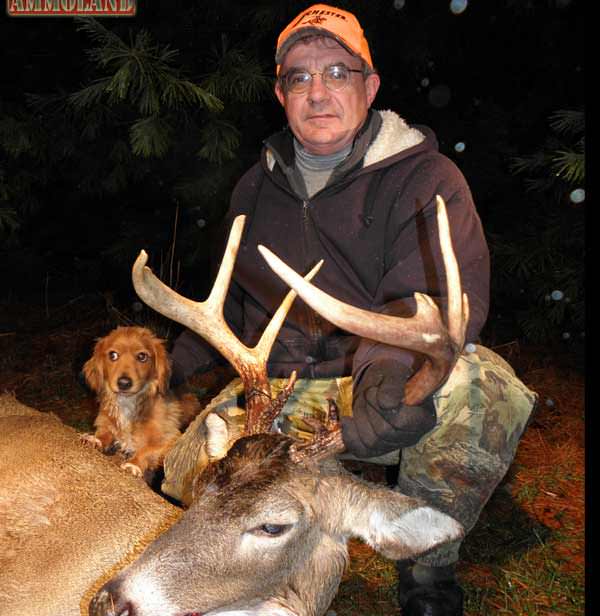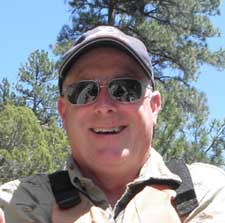

Lansing, Michigan – -(Ammoland.com)- No ethical sportsman wants to lose big game after the shot. In fact, it is the hunter’s responsibility and obligation to make every effort to recover game animals that have been shot, or to make every attempt to determine, if in fact, an animal has been shot at all.
Yet, over a dozen states prohibit the use of the most refined search “tool” available to them: tracking dogs.
As contradictory as it may seem, states such as West Virginia, do not allow any attempts to retrieve deer with dogs. Instead of writing laws to manage wildlife resources better, such states have all-encompassing laws designed to keep unscrupulous persons from “running” deer or actually hunting them with dogs; this means that recoverable deer will go to waste in some instances. These states don’t have to reinvent the wheel to get on board with a more sensible approach to this dilemma.
Consider Michigan’s law: It is illegal to make use of a dog in hunting deer or elk except that a dog may be used to locate a down or mortally wounded deer or elk, if the dog is kept on a leash and those in attendance do not possess a firearm, crossbow, or bow. Exception: If accompanied by a licensed dog tracker, a hunter may possess a firearm, a cocked crossbow, or a bow with nocked arrow, only at the time and point of kill. If the tracking is done at night, artificial lights ordinarily carried in the hand, or on the person, may be used. A dog that barks while tracking the deer shall not be used on public lands.
A licensed deer, elk, or bear hunter, if accompanied by a certified dog tracker, shall not have a live round in the chamber, a cocked crossbow, or a bow with a nocked arrow, except at the time and point of kill of the wounded deer, elk, or bear.
If a hunter hires a certified dog tracker to recover game, other requirements relative to notifying the DNR must be met so that law enforcement knows the effort is taking place. That way, if someone contacts them about what they believe may be an illegal hunting operation after hours – dogs, lights, even gunshots – officials have the facts at hand and are able to calm potential conflicts.
On the other hand, if a hunter has an uncertified dog and wants to track a deer, he can do so, as long as he is not carrying a firearm or bow on the retrieving effort and keeps the dog on a leash. This provision eliminates nighttime shooting of any kind, which is illegal under the hunting regulations for deer – again, unless certified trackers are employed.
Personally, I have had the pleasure of recovering several deer with dogs over the years. The first episode was with an untested Labrador retriever, who found my fatally shot deer within minutes, after my hunting partner and I couldn’t do it in hours.
Since then, several other dogs have been used with success. This past season, Reese – a dachshund/beagle mix – located a whitetail deer in the dense cover of high grass along a creek, when we had found no clues prior to calling in the dog.
I’ve yet to hear of any complications with Michigan’s dog-tracking law. Those states with blanket prohibitions against the use of dogs for tracking game, can take a lesson from the forward-thinking majority of states like Michigan.
There is a right way to do it opposed to the wrong way of not doing it at all.
Follow up column:
The above column covered the rationale for recovering Michigan big game through the use of blood tracking dogs. What follows is an outline detailing one means to retrieve animals and provides an option to access the assistance of trained tracking dogs alluded to in the hunting regulations.
Any hunter can appreciate a clean, ethical killing shot with no measurable tracking involved on a whitetail deer. However, conditions afield, equipment failures and human error may contribute to a less-than-perfect result. Of course, those opposed to hunting in any of its forms will jump at any chance to exploit unfortunate circumstances to further their anti-hunting agenda.
Funny how the same “logic” is never applied to automobile or plane crashes. If it were, we’d all be riding horseback or safer yet, walking. Instead, we have mandatory seat-belt laws and rigorous airline safety oversight – all designed to minimize the chances of the unthinkable. Similarly, dedicated sportsmen do everything within their control to make the perfect kill shot, but being human and using equipment produced by humans means things can go awry.
It’s perplexing to comprehend the paradox in a dozen states or more such as Colorado. There, it is illegal for a hunter to “fail to make a reasonable attempt to track and kill animals you wound or may have wounded” but the use of blood tracking dogs is illegal, as well. How any of this can be perceived as “reasonable” is beyond me.
On the contrary, in Michigan, common sense has prevailed and such nonsense is no longer the case. But, what if you or a friend has no tracking dog to aid in the recovery of a big game animal?
Answer: Michigan Deer Tracking Dogs.
For a negotiable fee, certified dog trackers, such as Rob Miller of Linden may come to your aid. Rob and his dachshund, Sypris, have recovered over 90 whitetail deer over the past few years to the delight of hunters within a one-hour radius of Linden. Others within the organization throughout Michigan have had similar results recovering all manner of big game, although for numerous reasons, successful recoveries cannot be guaranteed.
Each tracker sets their own rate, typically based on the distance they must travel and $100-$150 is a general starting point for local tracks (within a half hour drive), and it will go up from there. Success varies from 25 to 50 percent based on myriad variables.
Typically deer are recovered within two hours but if there is significant positive sign (i.e. good blood, or a visual on the deer and it appears severely wounded) the tracker will proceed. They will keep tracking until the deer is recovered or it is determined that signs indicate a deer is not mortally wounded.
Without a certified tracker, Michigan hunters can still track game animals with a dog, but no firearms or bows can accompany them on a retrieval mission (day or night), thus preventing what may appear to others as illegal hunting activity. Under Michigan regulations relative to certified trackers, law enforcement must be notified when a recovery effort begins and ends, regardless of the outcome. But, only with a certified tracker, can an animal be dispatched on the spot, if necessary.
Contradictory terms in Colorado need not apply to Michigan sportsmen and women seeking to finish the admirable job of game recovery.
For more information on tracking dogs, the website is www.michigandeertracknhounds.com.
About Glen WunderlichCharter Member Professional Outdoor Media Association (POMA). Outdoor writer and columnist for The Argus-Press (www.argus-press.com) and blog site at www.thinkingafield.org Member National Rifle Association (NRA), Michigan United Conservation Clubs (MUCC), member U.S. Sportsmen’s Alliance (USSA), Quality Deer Management Association (QDMA), Commemorative Bucks of Michigan (CBM).
